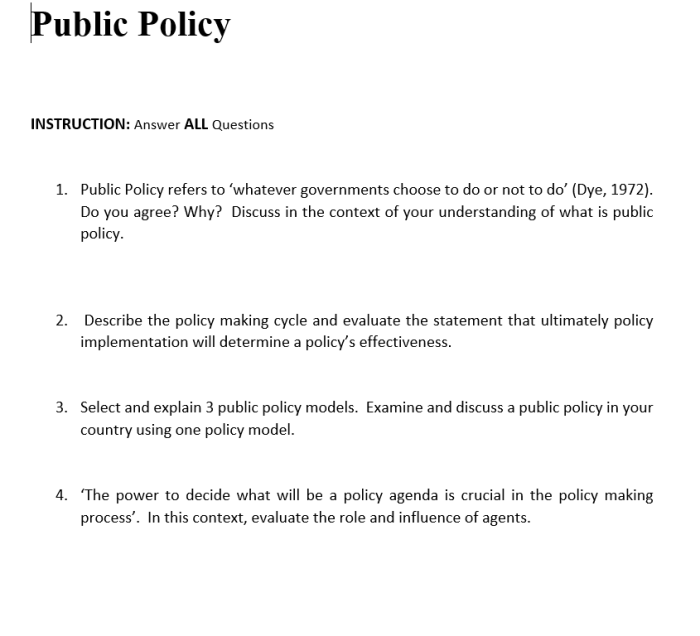The public in public policy icivics answer key serves as an indispensable guide to understanding the role of citizens in shaping public policies. It provides a comprehensive overview of the significance of public participation, the challenges it faces, and effective strategies to enhance it.
This guide delves into the concept of public policy, exploring its impact on society and emphasizing the importance of public engagement in the policymaking process. It highlights the barriers to effective participation, including socioeconomic factors and the influence of special interests.
The Role of the Public in Public Policy

Public policy encompasses the decisions, laws, and regulations made by governments to address societal issues. These policies profoundly impact our lives, shaping everything from education to healthcare, the economy, and the environment.
Public participation in policymaking is crucial for several reasons. First, it ensures that the voices and perspectives of all citizens are considered in the decision-making process. Second, it fosters legitimacy and trust in government institutions. Third, it helps to improve the quality of policies by incorporating diverse viewpoints and experiences.
There are numerous ways for the public to engage in policymaking, including attending public hearings, submitting written comments, participating in online forums, and contacting elected officials.
Challenges of Public Participation
Despite its importance, public participation in policymaking faces several challenges. These include:
- Lack of time and resources
- Complexity of policy issues
- Disproportionate influence of special interests
- Socioeconomic factors, such as poverty and lack of education, can also hinder participation.
Strategies for Enhancing Public Participation, The public in public policy icivics answer key
To overcome these challenges and enhance public participation, several strategies can be employed:
- Providing accessible information and resources to the public
- Creating opportunities for public input at various stages of the policymaking process
- Using innovative technologies to facilitate participation
- Building partnerships with community organizations and advocacy groups
Impact of Public Participation on Policy Outcomes
Research has consistently shown that public participation can have a positive impact on policy outcomes. For example, studies have found that policies developed with public input are more likely to be:
- Effective
- Efficient
- Equitable
Public participation also contributes to accountability and transparency in policymaking, as it provides a mechanism for citizens to hold their elected officials accountable for their decisions.
Case Studies of Successful Public Participation
Numerous successful examples of public participation in policymaking can be found around the world. One notable case study is the participatory budgeting process in Porto Alegre, Brazil. This process allows citizens to directly decide how a portion of the city’s budget is spent, leading to increased transparency, accountability, and community empowerment.
The Future of Public Participation
The future of public participation is promising. Emerging technologies and innovative approaches are creating new opportunities for citizens to engage in policymaking. For example, online platforms and social media are being used to facilitate public dialogue and gather input on policy issues.
As the world becomes increasingly complex and interconnected, public participation will become even more important in ensuring that the voices of all citizens are heard and that policies are responsive to their needs.
FAQ Compilation: The Public In Public Policy Icivics Answer Key
What is the role of the public in public policy?
The public plays a crucial role in public policy by providing input, feedback, and support for policy decisions. Their participation ensures that policies are responsive to their needs and concerns.
What are the challenges to public participation?
Barriers to public participation include lack of access to information, limited resources, and the influence of special interests. Socioeconomic factors can also affect participation, with marginalized communities often facing greater challenges.
How can public participation be enhanced?
Effective strategies to enhance public participation include increasing transparency and accountability, providing accessible information, and creating opportunities for diverse voices to be heard.